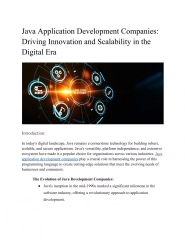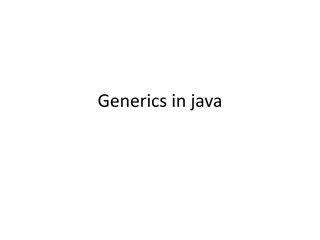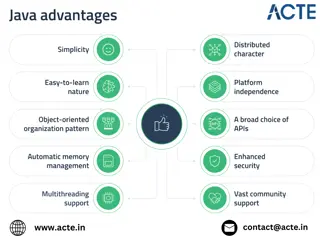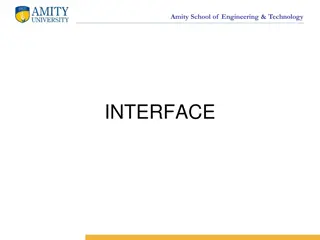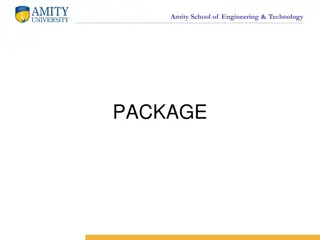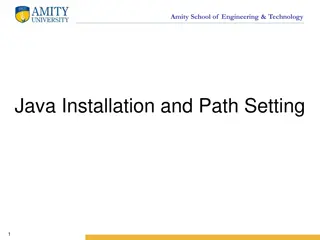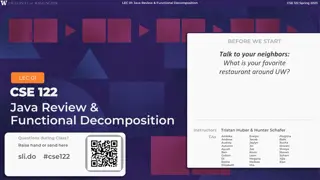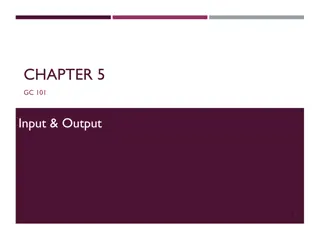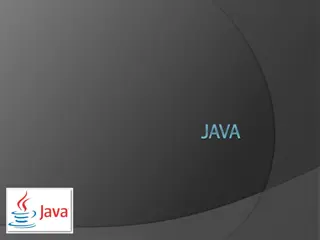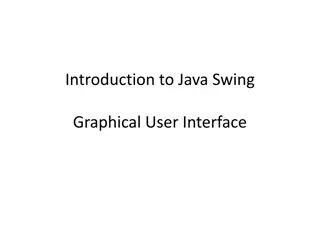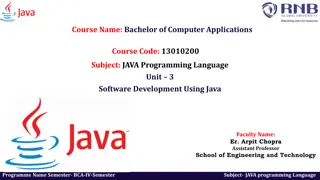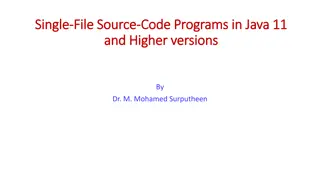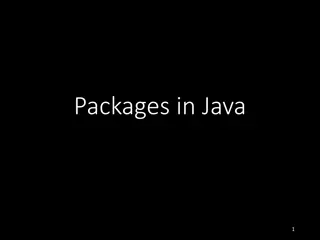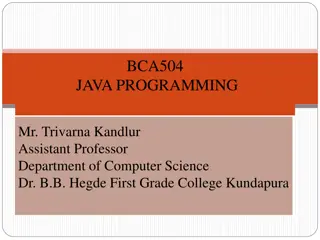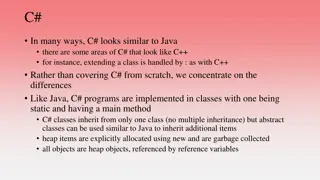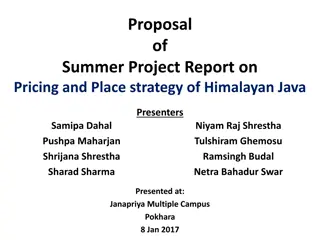
Maximizing Java's Potential: Releases, Modules, and Features
Discover how Java's rapid release cadence, modular structure, and preview features are shaping the future of programming. Explore topics such as switch expressions and the evolution of Java development in this insightful presentation by Simon Ritter, Deputy CTO of Azul Systems Inc.
Download Presentation

Please find below an Image/Link to download the presentation.
The content on the website is provided AS IS for your information and personal use only. It may not be sold, licensed, or shared on other websites without obtaining consent from the author. If you encounter any issues during the download, it is possible that the publisher has removed the file from their server.
You are allowed to download the files provided on this website for personal or commercial use, subject to the condition that they are used lawfully. All files are the property of their respective owners.
The content on the website is provided AS IS for your information and personal use only. It may not be sold, licensed, or shared on other websites without obtaining consent from the author.
E N D
Presentation Transcript
Getting The Most From Modern Java Presented by Simon Ritter, Deputy CTO | Azul Systems Inc.
Introduction Java has changed a lot Six-month release cadence Seven releases since JDK 9 More features being delivered faster than ever before 2
Incubator Modules Defined by JEP 11 Non-final APIs and non-final tools Deliver to developers to solicit feedback Can result in changes or even removal First example: HTTP/2 API (Introduced in JDK 9, final in JDK 11) 3
Preview Features Defined by JEP 12 New feature of the Java language, JVM or Java SE APIs Fully specified, fully implemented but not permanent Solicit developer real-world use and experience May lead to becoming a permanent feature in future release Must be explicitly enabled javac --release 14 --enable-preview ... java --enable-preview ... Preview APIs May be required for a preview language feature Part of the Java SE API (java or javax namespace) 4
Switch Expressions (Preview) Switch construct was a statement No concept of generating a result that could be assigned Rather clunky syntax Every case statement needs to be separated Must remember break (default is to fall through) Scope of local variables is not intuitive 6
Old-Style Switch Statement int numberOfLetters; switch (day) { case MONDAY: case FRIDAY: case SUNDAY: numberOfLetters = 6; break; case TUESDAY: numberOfLetters = 7; break; case THURSDAY: case SATURDAY: numberOfLetters = 8; break; case WEDNESDAY: numberOfLetters = 9; break; default: throw new IllegalStateException("Huh?: " + day); }; 7
New-Style Switch Expression int numberOfLetters = switch (day) { case MONDAY, FRIDAY, SUNDAY -> 6; case TUESDAY -> 7; case THURSDAY, SATURDAY -> 8; case WEDNESDAY -> 9; default -> throw new IllegalStateException("Huh?: " + day); };
New Old-Style Switch Expression int numberOfLetters = switch (day) { case MONDAY: case FRIDAY: case SUNDAY: break 6; case TUESDAY break 7; case THURSDAY case SATURDAY break 8; case WEDNESDAY break 9; default: throw new IllegalStateException("Huh?: " + day); };
Streams New collector, teeing teeing(Collector, Collector, BiFunction) Collect a stream using two collectors Use a BiFunction to merge the two collections Collector 1 Stream Result BiFunction Collector 2 10
Streams // Averaging Double average = Stream.of(1, 4, 5, 2, 1, 7) .collect(teeing(summingDouble(i -> i), counting(), (sum, n) -> sum / n)); 11
Text Blocks (Preview) String webPage = """ <html> <body> <p>My web page</p> </body> </html>"""; incidental white space System.out.println(webPage); $ java WebPage <html> <body> <p>My web page</p> </body> </html> $
Text Blocks (Preview) String webPage = """ <html> <body> Intentional indentation <p>My web page</p> </body> </html> """; incidental white space System.out.println(webPage); $ java WebPage <html> <body> <p>My web page</p> </body> </html> Additional blank line $
Switch Expression int numberOfLetters = switch (day) { case MONDAY: case FRIDAY: case SUNDAY: break 6; case TUESDAY break 7; case THURSDAY case SATURDAY break 8; case WEDNESDAY break 9; default: throw new IllegalStateException("Huh?: " + day); };
Switch Expression int numberOfLetters = switch (day) { case MONDAY: case FRIDAY: case SUNDAY: yield 6; case TUESDAY yield 7; case THURSDAY case SATURDAY yield 8; case WEDNESDAY yield 9; default: throw new IllegalStateException("Huh?: " + day); };
Simple Java Data Class class Point { private final double x; private final double y; public Point(double x, double y) { this.x = x; this.y = y; } public double x() { return x; } public double y() { return y; } } 18
Records (Preview) record Point(double x, double y) { } record Range(int low, int high) { public Range { // Compact constructor if (low > high) throw new IllegalArgumentException("Bad values"); } } 19
Record Additional Details Compact constructor can only throw unchecked exception Syntax does not allow for specifying a checked exception Object methods equals(), hashCode() and toString() can be overridden The base class of all records is java.lang.Record This is an example of a preview feature Java SE API Records cannot sub-class (but may implement interfaces) Records do not follow the Java bean pattern x() not getX() in previous example Instance fields cannot be added to a record Static fields can Records can be generic 20
Using instanceof if (obj instanceof String) { String s = (String)obj; System.out.println(s.length()); } 21
Pattern Matching instanceof (Preview) if (obj instanceof String s) System.out.println(s.length()); else // Use of s not allowed here if (obj instanceof String s && s.length() > 0) System.out.println(s.length()); // Compiler error if (obj instanceof String s || s.length() > 0) System.out.println(s.length()); 22
Pattern Matching instanceof (Preview) if (!(o instanceof String s && s.length() > 3) return; System.out.println(s.length()); 23
Text Blocks Second preview Two new escape sequences String continuous = """This line will not \ contain a newline in the middle and solves the extra blank line issue \ """; String endSpace = """This line will not \s lose the trailing spaces \s""";
Helpful NullPointerException Who's never had an NullPointerException? a.b.c.i = 99; Exception in thread "main" java.lang.NullPointerException at Prog.main(Prog.java:5) Exception in thread "main" java.lang.NullPointerException: Cannot read field "c" because "a.b" is null at Prog.main(Prog.java:5) Enabled with -XX:+ShowCodeDetailsInExceptionMessages 25
Java Inheritance A class (or interface) in Java can be sub-classed by any class Unless it is marked as final Shape Triangle Square Pentagon 27
Sealed Classes (JEP 360) Preview feature Sealed classes allow control over which classes can sub-class a class Think of final as the ultimate sealed class Although called sealed classes, this also applies to interfaces 28
Sealed Classes (JEP 360) Uses contextual keywords New idea replacing restricted identifiers and keywords sealed, permits and non-sealed Classes must all be in the same package or module public sealed class Shape permits Triangle, Square, Pentagon { ... } X Shape Triangle Square Pentagon Circle 29
Sealed Classes (JEP 360) All sub-classes must have inheritance capabilities explicitly specified // Restrict sub-classes to defined set public sealed class Triangle permits Equilateral, Isosoles extends Shape { ... } // Prevent any further sub-classing public final class Square extends Shape { ... } // Allow any classes to sub-class this one (open) public non-sealed class Pentagon extends Shape { ... } 30
Contextual Keyword Humour int non = 2; int sealed = 1; var var = non-sealed; 31
Hidden Classes (JEP 371) JVM rather than language-level feature Classes that cannot be used directly by the bytecodes of other classes Several situations where bytecodes generated at runtime Use of invokedynamic bytecode Lambdas are a good example Mostly bound to static class (not for use elsewhere) Often only used for short time Hidden classes can only be accessed via reflection Primarily intended for framework developers 32
Records (Second Preview) Record fields are now (really) final Cannot be changed via reflection (will throw IllegalAccessException) Native methods now explicitly prohibited Could introduce behaviour dependent on external state 33
Records (Second Preview) Local records Like a local class Implicitly static List<Seller> findTopSellers(List<Seller> sellers, int month) { // Local record record Sales(Seller seller, double sales) {} return sellers.stream() .map(seller -> new Sales(seller, salesInMonth(seller, month))) .sorted((s1, s2) -> Double.compare(s2.sales(), s1.sales())) .map(Sales::seller) .collect(toList()); } 34
Records (Second Preview) Records work with sealed classes (interfaces) public sealed interface Car permits RedCar, BlueCar { ... } public record RedCar(int w) implements Car { ... } public record BlueCar(long w, int c) implements Car { ... } 35
Pattern Matching instanceof (JEP 394) Now final, i.e. part of the Java SE specification Two minor changes to previous iterations Pattern variables are no longer implicitly final Compile-time error to compare an expression of type S against a pattern of type T where S is a sub-type of T static void printUpperLeftColoredPoint(Rectangle r) { if (r instanceof Rectangle rect) { System.out.println(rect); } } | Error: | pattern type Rectangle is a subtype of expression type Rectangle | if (r instanceof Rectangle rect) { | ^-------------------------^ 37
Add UNIX-Domain Socket Channels Add UNIX_AF socket channels Used for IPC on UNIX-based OSs and Windows Better security and performance than TCP/IP loopback connections Behaviour is identical No constructor, use factory methods var unix = UnixDomainSocketAddress.of("/tmp/foo"); 38
Streams mapMulti Similar to flatMap Each element on the input stream is mapped to zero or more elements on the output stream Difference is that a mapping can be applied at the same time Uses a BiConsumer Stream.of("Java", "Python", "JavaScript", "C#", "Ruby", "") .mapMulti((str, consumer) -> { for (int i = 0; i < str.length(); i++) consumer.accept(str.length()); }) .forEach(i -> System.out.print(i + " ")); // 4 4 4 4 6 6 6 6 6 6 10 10 10 10 10 10 10 10 10 10 2 2 4 4 4 4 39
Vector API (JEP 338) Incubator module (not part of the Java SE specification) API to express vector computations Compile at runtime to optimal hardware instructions Deliver superior performance to equivalent scalar operations Ideally, this would not be necessary Compiler should identify where vector operations can be used 40
Vector API (JEP 338) void scalarComputation(float[] a, float[] b, float[] c) { for (int i = 0; i < a.length; i++) c[i] = (a[i] * a[i] + b[i] * b[i]) * -1.0f; } static final VectorSpecies<Float> SPECIES = FloatVector.SPECIES_256; void vectorComputation(float[] a, float[] b, float[] c) { for (int i = 0; i < a.length; i += SPECIES.length()) { var m = SPECIES.indexInRange(i, a.length); var va = FloatVector.fromArray(SPECIES, a, i, m); var vb = FloatVector.fromArray(SPECIES, b, i, m); var vc = va.mul(va). add(vb.mul(vb)). neg(); vc.intoArray(c, i, m); } } 41
Foreign-Memory Access API (JEP 393) Introduced in JDK 14, now third incubator iteration API for safe and efficient access to memory outside of the Java heap MemorySegment Models a contiguous area of memory MemoryAddress Models an individual memory address (on or off heap) MemoryLayout Programmatic description of a MemorySegment try (MemorySegment segment = MemorySegment.allocateNative(100)) { for (int i = 0; i < 25; i++) MemoryAccess.setIntAtOffset(segment, i * 4, i); } 42
Foreign-Memory Access API (JEP 393) Example using MemoryLayout and VarHandle Simpler access of structured data SequenceLayout intArrayLayout = MemoryLayout.ofSequence(25, MemoryLayout.ofValueBits(32, ByteOrder.nativeOrder())); VarHandle indexedElementHandle = intArrayLayout.varHandle(int.class, PathElement.sequenceElement()); try (MemorySegment segment = MemorySegment.allocateNative(intArrayLayout)) { for (int i = 0; i < intArrayLayout.elementCount().getAsLong(); i++) indexedElementHandle.set(segment, (long) i, i); } 43
Foreign Linker API (JEP 389): Incubator Provides statically-typed, pure-Java access to native code Works in conjunction with the Foreign Memory Access API Initially targeted at C native code. C++ should follow More powerful when combined with Project Panama jextract command public static void main(String[] args) throws Throwable { var linker = CLinker.getInstance(); var lookup = LibraryLookup.ofDefault(); // get a native method handle for 'getpid' function var getpid = linker.downcallHandle(lookup.lookup("getpid").get(), MethodType.methodType(int.class), FunctionDescriptor.of(CLinker.C_INT)); System.out.println((int)getpid.invokeExact()); } 44
Warnings for Value-Based Classes Part of Project Valhalla, which adds value-types to Java Introduces the concept of primitive classes Primitive wrapper classes (Integer, Float, etc.) designated value-based Constructors were deprecated in JDK 9 Now marked as for removal Attempting to synchronize on an instance of a value-based class will issue a warning 45
Strongly Encapsulate JDK Internals By Default Encapsulation of JDK internal APIs started in JDK 9 Part of modularity (Project Jigsaw) Side effect was the potential to break many applications and frameworks Spring, etc. The big kill switch was included to get round this --illegal-access Four options: permit, warn, debug, deny Until now default has been permit New default is deny Critical internal APIs are still not encapsulated Including sun.misc.Unsafe 46
Zulu Enterprise Enhanced build of OpenJDK source code Fully TCK tested JDK 6, 7, 8, 11 and 13 TLS1.3, Flight Recorder backports Wide platform support: Intel 64-bit Windows, Mac, Linux Intel 32-bit Windows and Linux Real drop-in replacement for Oracle JDK Many enterprise customers No reports of any compatibility issues 48
Conclusions The six-month release cycle is working well JDK 12 to JDK 16 contains lots of great new features Start preparing for JDK 17, the next LTS Test with JDK 16 Use Zulu builds of OpenJDK if you want to deploy to production 49

